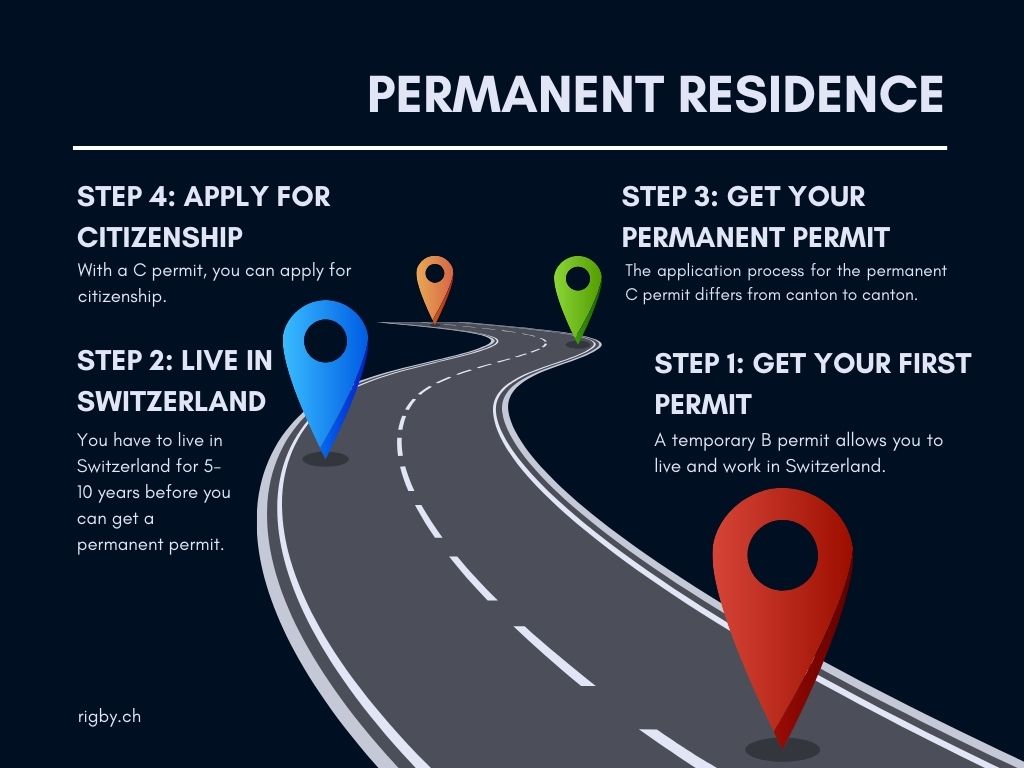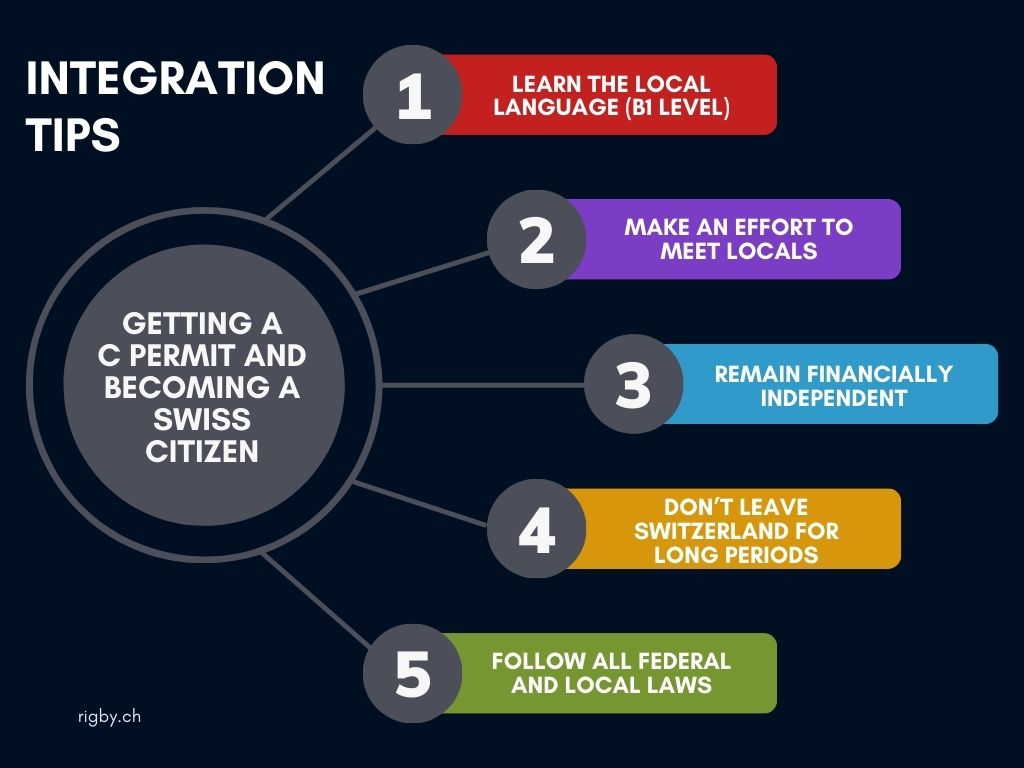Is It Hard to Move to Switzerland Permanently?
Can you live in Switzerland as a foreigner? If you have an EU or EFTA passport, are married to a Swiss person, or have very specialised skills, the answer is yes. You can find a temporary contract job and live in Switzerland for a few years or stay permanently and become a Swiss citizen. While the process takes time, it is reasonably straightforward.

Step 1: Get Your First Permit
You can get several temporary permits that allow you to move to Switzerland. The most common ones are:
- The B permit for temporary residence
- The G permit for cross-border commuters
- The L permit for short stays
There are also several permits for refugees and asylum seekers.
If you want to stay in Switzerland permanently, you’ll need a B permit, which is valid for five years and can be renewed. As a B permit holder, you can work and live in Switzerland, but you may have to stay in the area where you obtained your permit, especially if it’s linked to a particular job. After five to ten years, you can then apply for a permanent residence permit, also called a C permit.
Obtaining Your Permit
If you already have a job, your employer can most likely help with obtaining your permit. If not, contact the cantonal migration authorities in the area where you plan to work or settle. They can help you determine which permit is most suitable and apply for it.
Step 2: Stay in the Country for the Required Amount of Time
Most people who want to get a C permit and become permanent Swiss residents have to stay in Switzerland for 10 years, and often continuously. They must live inside the country for six months or more per year, and they usually have to stay in the same canton.
Citizens of certain EU or EFTA countries or those who can prove that they’ve successfully integrated into their local community may be able to obtain a C permit after five years.
What Does ‘Successfully Integrated’ Mean?
When checking your eligibility for a fast-track C permit, the authorities assess several factors, including your language competence, whether you’re studying or working, and whether you regularly interact with locals. You will also need to demonstrate respect for the Swiss constitutional values and legal process. If you break the law, you’re unlikely to get a C permit.
Step 3: Get Your C Permit
You won’t receive your C permit automatically; you have to apply for it. Typically, you submit your application to the cantonal authority first. Each area’s procedure is different. While some cantons require a motivation letter, others ask for a form and supporting documents such as payslips and a language certificate. Once your cantonal authority has approved your application, it gets sent to the State Secretariat for Migration in Bern. It can take up to a year for your C permit application to be processed.
Step 4: Apply for Citizenship
Once you hold a C permit, you can apply for Swiss citizenship in a process called naturalisation. Unless you’re married to a Swiss person or were born in Switzerland, you have to live in Switzerland as a foreigner for ten years before you become eligible. In addition to being a resident, you have to be integrated into society and familiar with the Swiss way of life. You start by applying to the canton or commune where you live. You will then be invited to an in-person interview during which naturalisation is explained in detail. The process varies from canton to canton, and you might have to take a naturalisation test that assesses your knowledge of Switzerland and your canton.

Can You Live in Switzerland as a Foreigner or Should You Apply for Citizenship?
Some people live in Switzerland with a C permit for many years. This may be a good choice for those who come from a country that doesn’t allow dual citizenship. Citizens of Austria, Japan, Norway, and several other countries may lose their original nationality if they become Swiss.
However, there are several advantages to naturalisation. Unlike Swiss citizens, C permit holders can’t vote, stand for public office, or leave Switzerland for more than six months without an authorisation of absence. They may also have their permit revoked if they commit a crime.
Can I Lose My C Permit?
Due to a law change in 2019, the authorities now have the power to downgrade your C permit to a B permit if you break the law or have integration deficits. These might include antisocial behaviour or reliance on social security. Although revocation of the C permit is rare and can be contested, it is still a risk and potentially a reason to apply for Swiss citizenship.
Tips for Successful Long-Term Integration
If you want to get a C permit and citizenship, thoroughly research the federal and local immigration rules as soon as you arrive in your new home. Make sure to integrate into society, demonstrate an interest in the country and culture, and spend most of your time in Switzerland.

Build Strong Ties with Your Community
If you want to get a fast-track C permit, learning the local language is a good first step. You will have to speak at a B1 level and write at an A2 level before you start your application. Additionally, you must build social ties with your community. If you don’t have Swiss relatives and you work in an international company where most employees aren’t natives, you’ll have to find ways of engaging locally.
Learn more: How to Learn German in Switzerland
Volunteer or join recreational clubs (Vereine, associations) to meet Swiss people in your neighbourhood. Check Facebook and other social networks, or find a suitable club in the official Vereinsverzeichnis/liste d’associations. Many expat clubs also consist of 10-20% Swiss members, so they can be a good place to start if you’re not yet fluent in the local language.
Don’t Leave Switzerland for Long Periods of Time
With both a B and C permit, you can’t leave Switzerland for more than six months at a time. However, you can freeze your B or C permit for up to four years if you need to leave. Before you plan a long trip, carefully review the rules, and contact your cantonal migration office. They will help you make sure you don’t accidentally lose your permit.
Avoid Financial Dependency
Financial independence is a big part of integration in Switzerland. When you live in Switzerland as a foreigner, you’re expected to either study or work. Reliance on the Swiss social security network and open debt collection suits could prevent you from receiving a B or C permit.
Avoid Breaking the Law
C permit holders who break the law can have their permits revoked, and B permit holders are less likely to get a C permit if they have a criminal record. Familiarise yourself with the most important Swiss laws as soon as you arrive. Pay special attention when driving. A serious speeding offence can go on your criminal record and therefore prevent you from getting a C permit.
Can you live in Switzerland as a foreigner? If you’re an EU or EFTA citizen or related to a Swiss person, you can move to Switzerland permanently and even become a citizen. Sign up for our newsletter to receive your free Welcome Guide, which explains life in Switzerland in more detail.